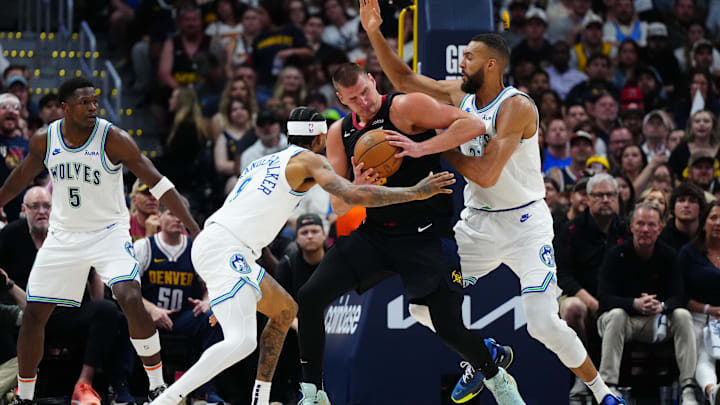The Minnesota Timberwolves knocked off the reigning champion Denver Nuggets to move onto the Western Conference Finals for the first time in 20 years. Minnesota won 98-90 behind an impressive team performance.
Anthony Edwards only scored 16 points, as he endured a rough shooting night, but he contributed eight boards and seven dimes. Karl-Anthony Towns shot an efficient 8-of-12 to chip in 23 points to go along with 12 rebounds.
Wolves' X-factor, Jaden McDaniels, tallied 23 points on the night. He coraled 6 boards, two steals, and a block while hounding Jamal Murray and Michael Poeter Jr. on defense. To round out the starters—Gobert chipped in 13 points and Conley had 10.
Despite the Wolves' franchise centerpiece going 6-of-24 from the floor, Minnesota still upset the Western Conference favorites. The Timberwolves were able to rally from a 20-point second-half deficit to knock the Nuggets out of the postseason. Composure, resilience, and most importantly, defense, gave the Wolves a fighting chance.
As it was the recipe for the Wolves' regular season success, Minnesota's stingy defense paved the way to a Conference Finals appearance. The Timberwolves forced 10 Denver turnovers on the night. Furthermore, Minnesota allowed the Nuggets to shoot 41.0 percent from the field and 24.2 percent from downtown.
The Timberwolves stymied everyone not named Nikola Jokic or Jamal Murray. The other Nuggets made just 8-of-28 field goals. Porter Jr. scored seven points, Aaron Gordon had four, and Kentavious Caldwell-Pope managed just five.
An understated achievement was the Timberwolves' suffocating defense on Porter Jr. After scorching the Los Angeles Lakers in the first round, the 6-foot-10 forward averaged just 10.7 points on 37.1/32.5/76.9 percent shooting splits in the Western Conference Semifinals.
Porter Jr.'s running mate, the high-flying Gordon, was a non-factor in Game 7. Prior to the final game of the series, Gordon had destroyed the Wolves' vaunted defense. The Arizona product scored 12 or more points for five consecutive games before falling flat last night.
Denver's stars, Jokic and Murray, attempted 55 shots to combine for 69 points. The Timberwolves forced the star duo into difficult field goal attempts and limited their playmaking ability. In the regular season, the pairing averaged 15.5 assists per game. In this series, their combined assist average decreased to 12.3. Last night, the duo mustered 10 assists between them.
Usually, allowing an opposing squad's best players to get a majority of the field goal attempts doesn't work. In his case, the Wolves' displayed a keen sense of understanding the Nuggets' offense. Minnesota forced Jokic to become a score-first player.
Denver used passing to their advantage in the regular season. The Nuggets ranked third in the NBA in assists per game, using Jokic as a central passing hub. Rather than sticking the Defensive Player of the Year on the MVP, Minnesota used Towns as his primary defender. In doing so, the Wolves' Gobert roamed the paint to deter cutters and drivers.
Time and time again, Minnesota's defense has reigned supreme. While impressive, it isn't a shock. The Wolves achieved so much success in the regular season because of their league-best defense. Minnesota led the league in defensive rating, opponent's points per game, and field goal percentage.
Without a suffocating defense, the Wolves would be an average squad—as evidenced by their finish a season ago. However, their top-notch defense has allowed the Wolves to come away victorious without prominent performances from its most talented players.
